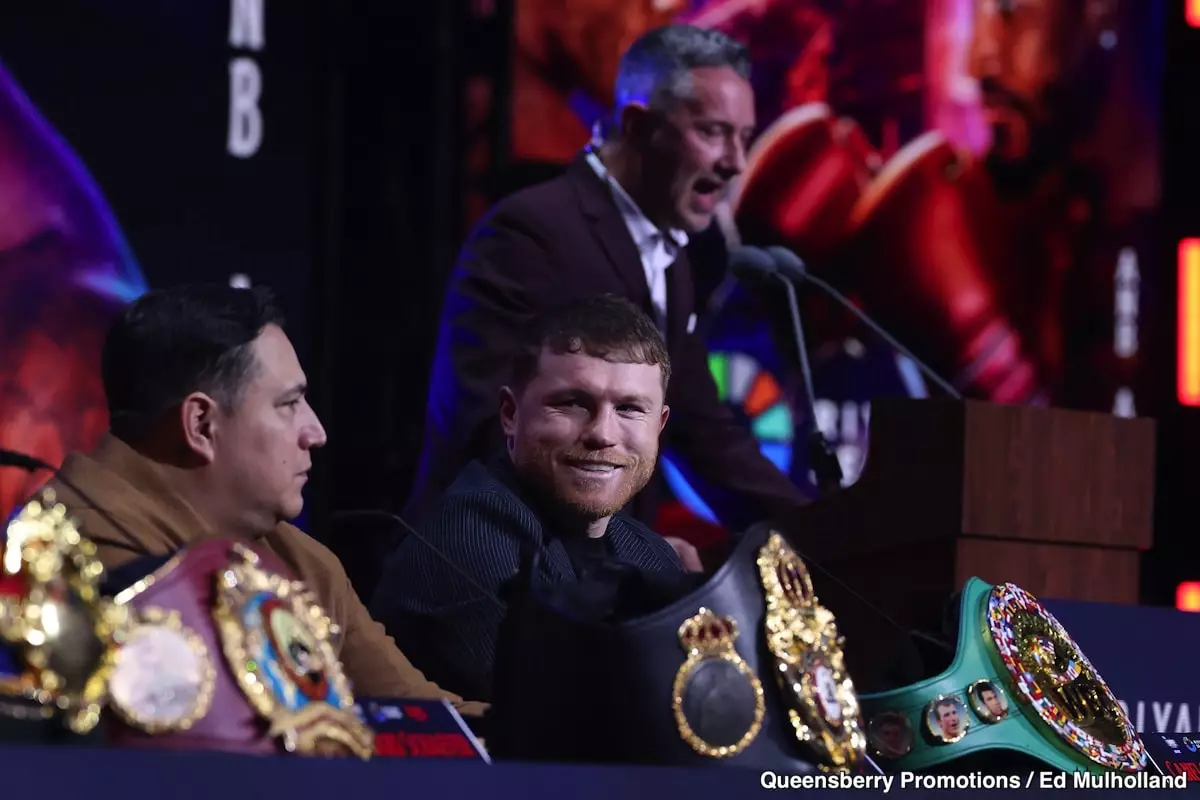Canelo Alvarez stands at a critical juncture in his boxing career, boldly asserting himself as the “Face of Boxing” at 34 years old. This self-proclaimed title comes with tremendous weight, invoking both respect and skepticism within the boxing community. Alvarez’s numerous accolades and financial success—he is the top PPV generator in North America—are significant accomplishments. However, as younger fighters enter the ring, adopting a more aggressive and risk-oriented approach, Alvarez’s continued reign in this context raises questions. He often cites loyalty and consistency with his training as core to his success, but does this sentiment genuinely resonate in a sport that increasingly prioritizes dynamic, high-stakes bouts?
While financial revenues continue to flow into Alvarez’s bank account, the saturation of PPV events, combined with a notable drop in competition, poses significant challenges. A fight against William Scull on May 3rd illustrates this point: boxed into a bundled package with a separate high-profile bout, it hardly paints a picture of an elite matchup. Would such pairings dilute the essence of professional boxing? Historical memory suggests that a true champion should champion the kind of challenges that galvanize public interest, not sidestep them.
Icon or Complacent Champion?
Alvarez himself acknowledges the challenge of his current standing, client to an overflowing roster of rising opponents. His potential duel against Terence Crawford is the standout though, not merely because of its competitive nature, but because it could reset Alvarez’s narrative within the sport. Yet, the notion that conquering Crawford would allow Alvarez to reclaim his status feels shallow. The boxing realm is laden with talented fighters—including David Benavidez and Dmitry Bivol—who represent formidable barriers to Alvarez’s claim.
One must question whether retaining the title of “best” is strictly dependent on victories against specific opponents. Alvarez’s failure to engage Benavidez is telling, a decision that seems to contradict his claims of being the elite figure in boxing. The past two years illustrate a marked difference in his fighting strategy; Canelo appears more concerned with safeguarding his legacy than aggressively pursuing it. His comments about being a role model for younger fighters seem almost disingenuous without the accompanying risks that he once so readily embraced in his youth.
Risk and Legacy: The Indispensable Ingredients
Canelo’s mantra about training and responsibility raises a pertinent issue within the boxing fraternity: how can he preach about seriousness in the sport when he is seemingly tiptoeing around challenges? Boxing, as an art and a sport, has always thrived on the element of danger—the very essence that separates the passionate contenders from those who merely wish to maintain their status. When one considers the likes of David Morrell or Artur Beterbiev—serious threats with untapped potential—it feels as though Alvarez’s current approach could be classified as legacy preservation rather than the pursuit of greatness.
Furthermore, in an age dominated by data and metrics, Canelo’s remarks about respect and loyalty feel less impactful. The truth is, numbers do speak—a fact he himself recognizes. If Alvarez truly considers himself the “Face of Boxing,” he must embrace the complexity of the sport, shoring up both his competitive edge and willingness to engage with rising stars.
A Future of Opportunities
Canelo’s vision on aiding future talents, including working with Jaime Munguia, creates an interesting dialogue within the community. His mentorship signifies an investment in the sport’s future but begs further scrutiny. Is he investing in boxing out of genuine love for the sport and its legacy, or as a strategic play to secure his position by insulating himself with a stable of promising fighters?
In this critical era, as the sport navigates through evolving sentiments about risk and achievement, Canelo Alvarez must redefine what it means to be the “Face of Boxing.” To fortify his legacy, it may be imperative for him to view the ring not merely as a battleground for personal accolades but as a vibrant landscape rife with opportunity and challenge. The heart of boxing pulses in the uncertainty, the unpredictability that fuels fans’ passionate support. If Alvarez is to remain at the apex, he must rekindle that spirit, fundamentally altering the trajectory of how both he and boxing are perceived in an era teeming with potential.


Leave a Reply